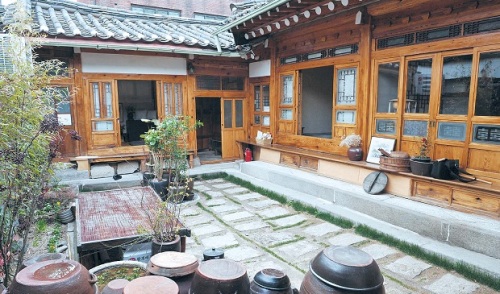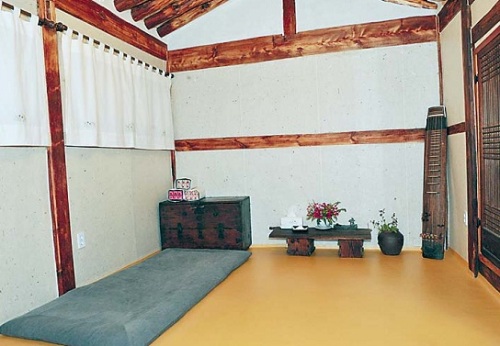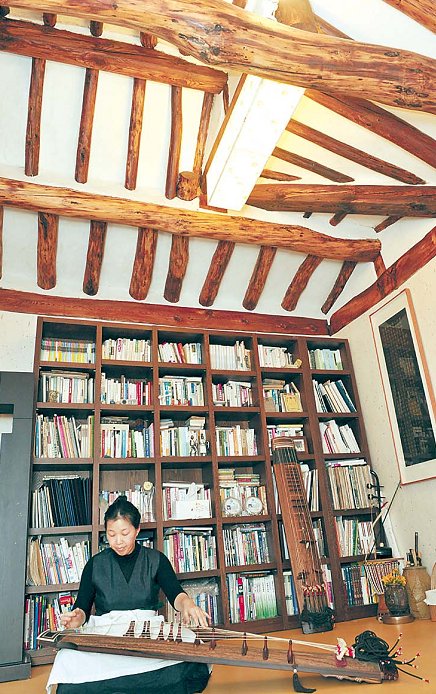
The inside view of guesthouse “Soriwool” in Seoul. (Chung Hee-cho/The Korea Herald)
Tucked away in a corner of the artsy district of Samcheong-dong, central Seoul, guesthouse Soriwool is a rare place to be.
Located near Gyeongbokgung, the main Joseon palace, the hanok guesthouse offers a unique “gugak” ― traditional Korean music ― experience, on top of its serene traditional architecture.
Whether you are a Seoulite who is used to the city where apartment complexes dominate the landscape, or a tourist visiting Korea for the first time ― a stay in this cozy hanok will be both restful and culturally awakening.
All of the five rooms of the guesthouse are decorated with Korea’s traditional instruments, including the gayageum, geomungo, piri, and haegeum. Every morning, owner Kim Hyun-ju plays a CD of Joseon court music, titled “Sujecheon.” The music, played by a traditional wind ensemble, completes the garden of the traditional house ― which is filled with traditional pots for red-pepper sauce and soybean paste.
“I’m a huge fan of gugak myself,” says Kim. “It’s been my dream to share gugak with locals and foreigners. Running a hanok guesthouse allowed me to fulfill that dream.”

A guest room
Kim, who was born and raised in Namwon, North Jeolla Province, started learning the gayageum, a string instrument, while attending middle school. The instrument only remained the former TV and radio writer’s hobby until she decided to teach gugak to her three sons 14 years ago. Inspired by Kim’s enthusiasm, all of her three children are pursuing careers as gugak artists at the moment; her eldest son is currently enrolled in Seoul National University’s Korean music program.
“My youngest son used to want to be a diplomat,” says Kim, dressed in hanbok, a traditional garment. “I told him, ‘You can do that through your music. There’s nothing better than gugak to promote the essence of Korean culture.’”
It’s been only three months since Kim opened Soriwool, but she hardly gets a day off. Last month, five Finnish artists, who visited Korea for the opening of their exhibition “Design Finland” at Seoul Arts Center, stayed for nearly two weeks at Kim’s hanok. Through word of mouth, Chinese envoys who are friends with a Korean diplomat will make their stays later this month.

Kim Hyun-ju, the host of Soriwool, plays the gayageum.
“I rented out this property in October of last year,” says Kim. “The place was a huge mess at the time. I renovated the place, spending more than 100 million won, re-doing each ceiling of every room of the house. It was important for me to provide an authentic hanok experience to my visitors.”
Kim, along with her sons, often performs for her visitors as well. Her repertoire includes the famous Korean folksong Arirang, pansori Chunhyang-ga, and other folk music from her home province, Jeolla. Sometimes she’d just practice the gayageum at the garden of her hanok, preparing for her weekly lessons. Her youngest son would do the same, playing piri, Korea’s double reed instrument. Any visitor is welcome to watch them practice.
“Playing the gayageum is just a part of my life,” she says. “So the visitors get to see the life of a Korean person living in hanok when I practice the instrument. There’s no staging. I try to blur the boundaries between the life as a host of this place and life as myself.”
Reservations for Soriwool can be made online or by phone. Room rates range from 50,000 won ($44) to 120,000 won ($106). Breakfast is included. For more information, call (02) 576-5556 or visit www.soriwool.com
Other optionsHanok & Korean tea:
Tea Guesthouse If you are interested in experiencing Korea’s tea culture, instead of gugak, check out this guesthouse located in Gye-dong, central Seoul. Since its opening in 2006, the guesthouse has been known for its indoor and outdoor areas where visitors can drink traditional tea and engage in tea-themed activities. Its garden, in particular, is known for its bamboo and a pond. There is a separate laundry room, and barbeque equipment is available for rent for those who book in advance. The hanok is built with old pine trees, and its rooms’ ondol (underfloor heating) is heated by burning bamboo. Room rates range from 70,000 won to 160,000 won. For reservations, call (02) 3675-9877 or visit their English-language website, www.teaguesthouse.com.
Hanok & modern furniture:Market M Hanok Residence
Market M, a modern furniture and living store, last year started a special project that combines a hanok and its products.
Located in Tongin-dong, central Seoul, the “Market M Hanok Residence” is a unique hanok accommodation that’s decorated with Market M’s simple and modern furniture and living arrangements. It offers a rare opportunity to rent out the entire property of a beautiful hanok and stay with your close friends and family, or even just by yourself ― without having to share the space with others. The small hanok consists of its own yard, two bedrooms, one living room, one kitchen and a bathroom. Visitors are allowed to cook in the oven-equipped kitchen, and freely use the Market M products in the house. A maximum of four people are allowed to share the property. Rates range from 150,000 won to 200,000 won, depending on the day of the week. For more information, call (02) 3142-4769 or visit its English website http://www.market-m.co.kr/html/newpage.html?code=21.
Outside of Seoul:
Korea Tourism Organization has a list of hanok accommodations available in Seoul and other cities across the country on its website. Visit http://english.visitkorea.or.kr/enu/AC/AC_EN_4_5.jsp for the full list. For more inquires, call (02) 729-9600.
By Claire Lee (
dyc@heraldcorp.com)



![[Exclusive] Korean military set to ban iPhones over 'security' concerns](http://res.heraldm.com/phpwas/restmb_idxmake.php?idx=645&simg=/content/image/2024/04/23/20240423050599_0.jpg&u=20240423183955)

![[Graphic News] 77% of young Koreans still financially dependent](http://res.heraldm.com/phpwas/restmb_idxmake.php?idx=645&simg=/content/image/2024/04/22/20240422050762_0.gif&u=)


